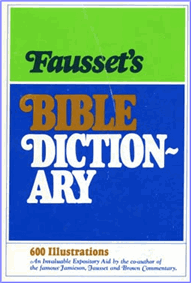Fausset's Bible Dictionary
A B C D E F G H I J K L M N O P Q R S T U V W X Y Z
Women
Enjoyed a status in Israel not assigned to them in the East now. Mahometanism especially has degraded women in Asia and Africa; anciently they had a liberty not now accorded them, veiling was not then required as now: e.g. Rebekah, Genesis 24:64-65; Rachel, Genesis 29:11; Sarah, Genesis 12:14-19; Miriam led a band of women with triumphant song, Exodus 15:20-21; so Jephthah's daughter, Judges 11:34; the maidens of Shiloh, Judges 21:21; the women meeting Saul and David after victory; 1 Samuel 18:6-7; Hannah, 1 Samuel 2:1; Deborah, Judges 4 and Judges 5; Huldah, 2 Kings 22:14; Noadiah, Nehemiah 6:14; Anna, Luke 2:36.
The virtuous matron is admirably pictured Proverbs 31:10, etc. Polygamy transferred power from the wives to the queen mother (called therefore gebiraah "powerful"), 1 Kings 2:19; 1 Kings 15:13; separate establishments were kept for the wives collectively or individually, "the house of the women" (Esther 2:3; Esther 2:9; 1 Kings 7:8); the wives had severally a separate tent (Genesis 31:33); the women were present at table (John 2:3; John 12:2; Job 1:4).
Bibliography Information
Fausset, Andrew Robert M.A., D.D., "Definition for 'women' Fausset's Bible Dictionary".
bible-history.com - Fausset's; 1878.
Copyright Information
© Fausset's Bible Dictionary
Fausset's Bible Dictionary Home
Bible History Online Home
Bible Encyclopedia (ISBE)
Online Bible (KJV)
Naves Topical Bible
Smith's Bible Dictionary
Easton's Bible Dictionary
Schaff's Bible Dictionary
Fausset's Bible Dictionary
Matthew Henry Bible Commentary
Hitchcock's Bible Dictionary

Dr. A.R. Fausset
Popular and Trending:
Meaning and definition of fasting, what is fasting in the bible, fasting definition, why should I fast, the power of prayer and fasting, Location of Galilee, where was galilee in the bible?, fasting definition, Galilee region, cities of Galilee, Sea of Galilee, Definition of biblical fire, what is fire in the bible?, fire and brimstone, fire meaning, baking bread with fire, Definition of the biblical firmament in Genesis, what is the firmament in the bible?, was the firmament the third heaven, firmament meaning, did the firmament bring the flood of Noah?.
